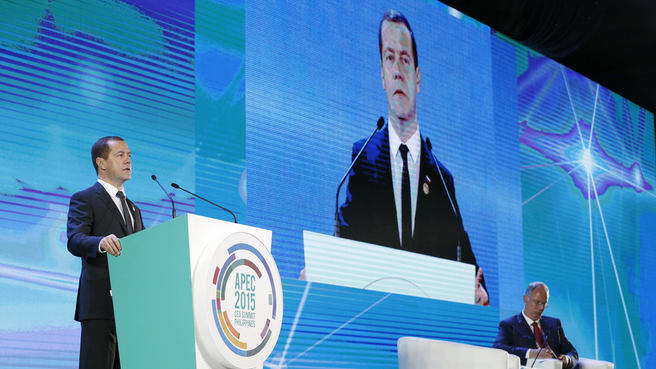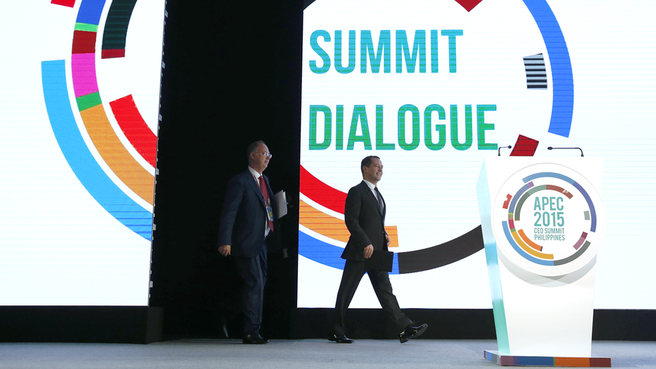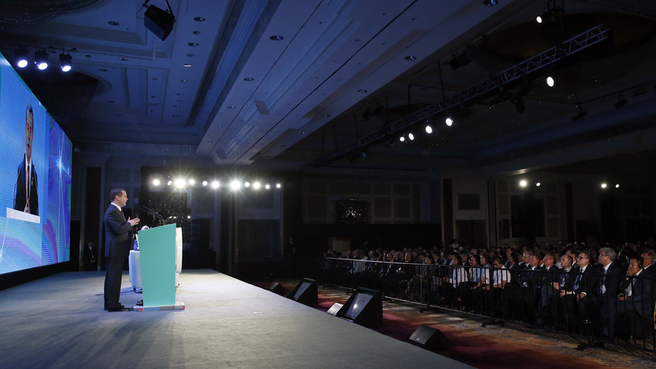Dmitry Medvedev attended the APEC CEO Summit.
Dmitry Medvedev’s answers to questions from session participants
Visit
-
Dmitry Medvedev meets with President of the Republic of the Philippines Benigno Aquino III
-
Dmitry Medvedev attends the APEC leaders’ dialogue with ABAC members
-
Dmitry Medvedev meets with Prime Minister of Thailand Prayut Chan-o-cha
-
Dmitry Medvedev meets with President of the Socialist Republic of Vietnam Truong Tan Sang
Asia-Pacific Economic Cooperation (APEC) is an informal international forum that was established in 1989 to promote dialogue between the regional economies.
APEC has 21 members: Australia, Brunei Darussalam, Canada, Chile, the People’s Republic of China, Hong Kong, Indonesia, Japan, the Republic of Korea, Malaysia, Mexico, New Zealand, Papua New Guinea, Peru, the Philippines, Russia, Singapore, Chinese Taipei, Thailand, the United States and Vietnam. They account for 40 percent of the world’s population, 57 percent of global GDP, 48 percent of global trade and over 40 percent of cross-border investment.
The governing bodies of the forum, with decisions taken by consensus and implemented on a voluntary basis, are the annual leaders’ meetings and meetings of the ministers of trade and foreign affairs that are held ahead of the leaders’ meetings. The forum’s annual agenda also includes sectoral ministerial meetings, meetings of senior officials and meetings of about 40 sectoral expert groups.
The APEC CEO Summit was initiated on the sidelines of the APEC Leaders’ Meeting in the Philippines in 1996 and is the premier business forum in the Asia-Pacific region. Bringing together global business executives, economic leaders and policy makers, it is a unique platform where the business community can directly engage with the APEC economies’ leaders.
The CEO Summit is the most important business event of the week-long APEC meeting. It is held immediately before the annual APEC Economic Leaders’ Meeting.
This year, the APEC CEO Summit will focus on maintaining economic growth in Asia Pacific, the importance of economic reforms and the involvement of business, the challenges of urban development and infrastructure, and the growth of global imbalances.
Dmitry Medvedev’s address:
Ladies and gentlemen, I’d like to express our gratitude to the host, the Philippines, for the excellent organisation of this event. I am honoured to be able to address this respected platform, the APEC CEO Summit, which took time to become established but is now by rights considered an economic and political barometer in the Asia-Pacific region and the world.
The theme of the 2015 APEC CEO Summit is Creating the Future: Better. Stronger. Together. It is a good theme, but it is doubly important in the current situation.
I must say a few words about the recent tragic events. The terrorist attacks against Russia and France are spearheaded against the entire world.
The growth of terrorism is a global challenge, a challenge to the entire civilised world. And we must give a common answer to it by coordinating and joining our efforts. The downing of a Russian plane over the Sinai Peninsula, in which 224 people have died, and the indiscriminate killing of people in Paris are not crimes committed against an individual country, but a crime against the entire world, and so it is together that we must stand against terrorism.
Events such as the APEC Leaders’ Meeting help strengthen our cooperation in all spheres. This stance is fully in keeping with Russia’s policy in Asia Pacific. I’d like to remind you that two-thirds of Russia’s territory is located in Asia, and hence Russia is inseparably linked to this region. It is our strategic policy to develop cooperation with all regional countries and to contribute to the solution of current challenges in the region. And it doesn’t depend on the political situation.
We’ve met at a challenging economic time. Having said that, I don’t remember meeting at a problem-free period. But still, the current situation really is unstable and volatile. All of us, including the APEC economies and other nations, are searching for answers to difficult questions. These questions include: How to spur economic growth amid global instability? How to use current technology, social and economic trends for development? How to enhance our competitiveness and to find our place in this new reality?
It’s clear that there are no universal answers to these questions. However, there are basic factors without which we cannot create an effective architecture for modern economic development, and I would like to go over them.
The first factor is regional integration, which is a key priority in the Asia-Pacific Region.
Russia has been advocating deeper regional integration. We believe that the preferential trade agreements that are signed within the forum’s framework, though very important, should not replace or damage but complement the multilateral trade system and the existing economic ties.
As you know, the Eurasian Economic Union (EAEU) has been operational for almost a year. Two more countries have joined it, and now the EAEU has five full members. We have been working to develop mutually beneficial cooperation with all our partners around the world, which amounts to our contribution to integration. We have reached an agreement with our Chinese partners to combine integration between the EAEU countries with China’s Silk Road Economic Belt. In May this year, the EAEU signed a preferential trade agreement with Vietnam. Similar agreements are being considered with other countries. Overall, the Eurasian Economic Commission has received around 40 free trade zone applications from countries and associations.
Considering this strategic goal, global trade rules should remain universal (this is of crucial importance) and should be developed at a common platform, primarily the World Trade Organisation, for this is what it was created for.
It’s logical that all concerned parties should be involved in this work. This is the only way to coordinate absolutely legitimate standards that would be applicable to all members. Hence, I consider it of utmost importance for the Asia-Pacific forum to maintain a common and consistent stance on strengthening the multilateral trade system, including within the framework of the Bogor Goals.
The second factor, which I’d like to mention and which, I’m sure, my colleagues have already mentioned, concerns innovation and human capital development.
The new industrial revolution, including the so-called big challenges, has affected all countries. To keep afloat and to win in the modern competition, one must react to them quickly and appropriately.
It’s important that the APEC economies complement each other in many spheres, including research, the experimental capability, the human and educational potential, and the commercialisation of innovations. The joint, practical use of these advantages will create a new quality of economic development in the region. This offers a lot of new opportunities for business, including small and medium enterprises. Russia is ready to contribute to this joint work.
Next year, we will host a global innovation forum, the IASP World Conference on Science Parks and Areas of Innovation. We are inviting our APEC partners to attend it.
The third factor without which regional integration, breakthrough innovations and the development of human capital will be impossible is investment, which is a commonplace truth.
In general, we are satisfied with Russia’s increasing contribution to the Asia-Pacific agenda, as evidenced, in part, by the growth of Russia’s trade with the regional economies. The Asian Pacific economies account for over 25 percent of Russia’s trade, which is much more than it used to be only recently. At the same time, direct mutual investments by the Asia-Pacific economies and Russia have not been growing as dynamically as we would like. To date, they only account for about $10 billion. We have set up mutual investment funds to increase this figure. We have created such funds with China, Japan and the Republic of Korea. We are now considering using this tool in our relations with the other Asia-Pacific economies.
Our project for the accelerated development of Siberia and the Far East offers virtually inexhaustible opportunities. It is based on a system of priority development areas (PDAs) with preferential tax rates and administration incentives. We have created nine PDAs. We try to apply the best investment practices that are widely used in the Asia-Pacific economies. We also relied on the Asia-Pacific practices and analysed our partners’ legislation when preparing the law on priority development areas.
Even more preferences will be offered to residents of the Free Port of Vladivostok. We plan to use a similar preference system in several other major ports in Russia’s Far East.
As I said, Russia intends to contribute to the settlement of the most challenging regional issues, for example energy security. It’s notable that the region has an energy deficit despite the considerable oil and gas reserves. Due to its geographical proximity and huge energy resources, Russia can provide stable, long-term deliveries of natural resources to the countries of the region at competitive prices, which is very important. This opportunity should be utilised with maximum effectiveness in the interests of Asia-Pacific nations.
Food security is another issue of major significance with major cooperation potential for many regional economies. This huge region, with its large population, keeps growing, which will inevitably increase the importance of the food security issue.
Russia grows large grain harvests and exports large volumes of grain. We believe that we will be able to export from 35 to 40 million tonnes of grain by 2020, which will help strengthen food security. We can not only export grain, but also launch large-scale cooperation projects in this sphere with our regional partners and other participants in the Asia-Pacific market.
Ladies and gentlemen, colleagues, the issue my colleagues and I have outlined here do not exhaust the cooperation agendas for our economies. There are broad opportunities for expanding this cooperation. What we need is for businesses to combine efforts with the governments to use these opportunities in the best interests of the Asia-Pacific Region, that is, in our common interests. Thank you.
Dmitry
Medvedev’s answers to questions from session participants:
Question: In your opinion, are the business climate and economic situation in Russia attractive for foreign investors?
Dmitry Medvedev: We may have problems, but we also have our strong sides. Russia is facing major challenges now, just as other countries. This could be one of the most difficult periods in our history. The plummeting oil prices and the rouble have had a major impact, plus we’ve been living under the pressure of sanctions for a year and a half. Yet our economic and financial situation is sufficiently stable; we have weathered the negative price fluctuations and managed to maintain investors’ interest.
There are elements in this situation that can benefit foreign investors, primarily the rouble devaluation and the opportunity to buy Russian assets at a lower cost that some time ago. On the other hand, the conditions for business localisation have improved, and there are additional advantages for export-oriented companies.
Faced with tough competition, we continue to improve our business climate. This is a Government priority. We have launched the National Business Initiative to liberalise legislation, develop dialogue with the business community and improve business positions. In particular, we’ve stopped the collection of several non-tax payments until 1 January 2019 to improve conditions for doing business in the current climate.
Considerable progress has been made in the development of public-private partnerships. We are trying to become more proactive in foreign markets and have created special institutions for this, including the Russian Export Centre. Some of our positions have improved, as you can see from international ratings. The latest Doing Business report shows that Russia has moved up and joined the top 50.
In short, this is the current trend. We have moved ahead of a number of countries which we used to compete with. We hope that our Asia-Pacific partners will bear this in mind when making investment decisions.
Question: You have said that Siberia and Russia’s Far East have rich resources and a huge development potential for investment. How do you plan to attract foreign companies to these projects?
Dmitry Medvedev: Russia is the biggest country in the world, and we plan to make the development of Siberia and the Far East a national priority in the 21st century. These vast areas have a plethora of mineral deposits, which cannot be developed properly without foreign investment. We hope our partners will actively invest in their development.
What have we done for this? I’m referring to the creation of a special legal framework. The Russian Government has analysed the laws of the Asia-Pacific economies and have identified priority development areas. This system has been developed specially for Russia’s Far East. It includes tax incentives, opportunities for infrastructure investment, visa facilitation, and the so-called one-stop-shop system for registering companies and dealing with administration issues. We have already registered nine priority development areas. Around 70 residents are ready to start working there. To date, the pledged volume of investment is about $5 billion, and we have barely started.
One more way to stimulate investment in Siberia and the Far East is to create free ports or porto franco areas. This model is widely used in the region, but we have only begun to introduce it in Russia. We will begin with Vladivostok, and if this model proves effective, we will apply it also in other regions. Our free port will offer all of the above incentives, including tax and infrastructure ones.
We are open to the proposals of our partners and foreign investors. If it turns out that our legislation needs adjusting, we will analyse the possibility and do it.
Question: Can you tell us which areas of innovation and technological cooperation are a priority for Russia?
Dmitry Medvedev: Innovations are crucial for the development of any country, including Russia. We have approved a National Technology Initiative, which is a medium-term programme that includes several roadmaps. We have selected nine target markets for investment through public-private partnerships. I have recently approved four roadmaps that focus on different areas, including the AutoNet system of unmanned management of road vehicles and the NeuroNet technology for creating artificial elements of consciousness and mentality. We plan to approve several more roadmaps soon. Russia has very strong research centres, which we would like to involve in the implementation of this initiative.
Asia Pacific is extremely attractive for us in this respect. In fact, we have proposed creating a common research space of the APEC economies. We hope they will show interest for our research infrastructure, especially considering mega-science projects that call for harmonising the research policies of many countries.
We have an annual Open Innovations Forum. This year, its theme was Humanity in the Centre of the Technological Revolution. The forum is an open platform, and I would like to invite our APEC partners to attend it next year. Every year, we offer preferences to one of the participating countries. We did this with our Chinese partners in 2014, with France and Finland in 2013, and we are ready to continue to do this. Technological cooperation is of crucial significance for our future, we hope to develop very positive relations with companies from the APEC economies in this sphere.















